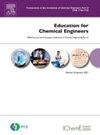ChEngBoost:生物技术化学工程基础的维他命化和游戏化问题学习
IF 2.3
2区 教育学
Q1 EDUCATION, SCIENTIFIC DISCIPLINES
引用次数: 0
摘要
本研究提出一种游戏化驱动的专案学习(PBL)方法,以强化生物科技学生在化学工程教育中的形成性学习。核心方法是ChEngBoost,包括五个逐步具有挑战性的课堂问题解决课程,讨论稳定和非稳定条件下的质量和能量平衡。游戏化原则(游戏邦注:如独占性、机会、惊喜和竞争)被用于提升内在和外在动机。在有限的时间内,每次提交的合格/不合格评分标准集中在功效和效率上。一个结构化的评分系统,以维生素的挑战,奖励个人5 %的奖金,最高20% %,分配给考试或任务的分数,没有惩罚未交付或不正确的解决方案。分数膨胀被限制在学生个人分数的10% %以内。因此,实际成绩的提高是适度的,尽管引人注目的是,参与度和积极性显著提高,因为超过90% %的学生在李克特量表评估中将他们的经历评为4级或5级。除了学术参与之外,该方法还有助于培养关键的横向技能,如解决问题、团队合作和不确定性下的决策。这些发现支持游戏化PBL的潜力,不仅可以提高学习成果,还可以提高未来的专业表现。在其他学科中采用这种方法的积极接受和意愿突出了它在工程教育中更广泛应用的潜力。本文章由计算机程序翻译,如有差异,请以英文原文为准。
ChEngBoost: Vitaminised and gamified problem-based learning of chemical engineering bases in biotechnology
This study presents a gamification-driven project-based learning (PBL) approach to enhance formative learning in chemical engineering education for biotechnology students. The core methodology, ChEngBoost, consists of the incardination of five progressively challenging in-class problem-solving sessions on mass and energy balances under steady and non-steady conditions. Gamification principles such as exclusivity, opportunity, surprise, and competition were incorporated to boost intrinsic and extrinsic motivation. A pass/fail grading criterion for each submission, at limited times, was focused on efficacy and efficiency. A structured scoring system to vitaminize the challenges, awarded individual 5 % bonuses, up to a maximum 20 %, to be assigned to either exam or task marks, with no penalty for non-delivery or incorrect solutions. Grade inflation was controlled by capping improvements within 10 % of students’ individual marks. The actual grade increases were therefore modest, although, remarkably, engagement and motivation significantly improved, as over 90 % of students rated their experience at levels 4 or 5 on Likert-scale evaluations. Beyond academic engagement, the methodology contributed to foster key transversal skills such as problem-solving, teamwork, and decision-making under uncertainty. These findings support the potential of gamified PBL to enhance not only learning outcomes but also future professional performance. The positive reception and willingness to adopt this methodology in other subjects highlighted its potential for broader application in engineering education.
求助全文
通过发布文献求助,成功后即可免费获取论文全文。
去求助
来源期刊

Education for Chemical Engineers
Multiple-
CiteScore
8.80
自引率
17.90%
发文量
30
审稿时长
31 days
期刊介绍:
Education for Chemical Engineers was launched in 2006 with a remit to publisheducation research papers, resource reviews and teaching and learning notes. ECE is targeted at chemical engineering academics and educators, discussing the ongoingchanges and development in chemical engineering education. This international title publishes papers from around the world, creating a global network of chemical engineering academics. Papers demonstrating how educational research results can be applied to chemical engineering education are particularly welcome, as are the accounts of research work that brings new perspectives to established principles, highlighting unsolved problems or indicating direction for future research relevant to chemical engineering education. Core topic areas: -Assessment- Accreditation- Curriculum development and transformation- Design- Diversity- Distance education-- E-learning Entrepreneurship programs- Industry-academic linkages- Benchmarking- Lifelong learning- Multidisciplinary programs- Outreach from kindergarten to high school programs- Student recruitment and retention and transition programs- New technology- Problem-based learning- Social responsibility and professionalism- Teamwork- Web-based learning
 求助内容:
求助内容: 应助结果提醒方式:
应助结果提醒方式:


